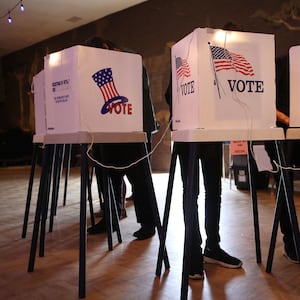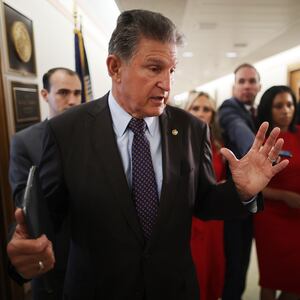For months, progressives have held Congress’ annual August recess as a critical deadline for addressing voting and elections reforms.
And now, that deadline is blown.
After they finished laying the groundwork for a $3.5 trillion economic package in the early hours of Wednesday morning, Democratic senators didn’t skip town without taking some kind of action. Majority Leader Chuck Schumer (D-NY) got 50 Democrats to get behind a procedural vote to tee up another vote on their signature For the People Act elections bill—in September.
Then, Schumer’s requests to bring up another pair of election reforms were promptly blocked by Sen. Ted Cruz (R-TX). With that, the senators promptly hit the exits, not to return until next month. The August fireworks that some progressives had hoped to see on the Senate floor failed to get off the ground.
The now-familiar dynamic reinforces a cold, unchanged political reality for Democrats. Their election bills won’t become law unless all Democrats support changes to the Senate’s 60-vote threshold to pass bills—and the fact that nearly all of them support those election bills isn’t bringing about the rule-change as quickly as they want.
The self-imposed deadline of August isn’t entirely superficial. The closer the 2022 midterm elections get, the less impactful Democrats’ proposals may be in countering the raft of GOP laws being enacted on the state level.
And on another front, many Democrats admit their window has closed to influence the once-a-decade congressional redistricting process, through which Republicans are expected to pick up seats in the narrowly divided House.
Their legislation has anti-gerrymandering provisions, but now there’s virtually no chance such provisions could take effect until the next round of redistricting in 2032.
“We are getting very close to a point where it’s tough to see that piece of it having a meaningful impact on 2022 lines,” said Dan Kalik, senior political adviser for the progressive group MoveOn.
Leaving town with all of this hanging over them didn’t sit well with Democratic senators. “It’s frustrating,” said Sen. Alex Padilla (D-CA), before the vote on Tuesday night. “But we keep up the fight.”
The activists who’ve spent months pushing those Democrats to pass democracy reforms sounded a similar note.
“It’s definitely frustrating to know that we have been in this fight and working, organizing, to get this legislation passed, and that it will not come to fruition this August,” said Stephany Spaulding, spokesperson for the progressive advocacy coalition Just Democracy.
Their focus now shifts to September, which will be no less packed than recent months, as Democrats prepare to muscle a partisan $3.5 trillion economic package through Congress.
And as the Democratic base grows even more impatient for action on voting rights, lawmakers who are strongly supportive of passing election bills stress that it is a long game.
It was a tough lift to get all 50 Senate Democrats to vote to consider the “For The People Act,” known as S.1 in the Senate, back in June. The entire caucus’ support is not assured for the substance of the package itself. A group of senators is still working on crafting a compromise that a key holdout, Sen. Joe Manchin (D-WV), could support.
“What we’re doing now is we’re trying to unify the Democrats between a single robust voting rights proposal,” said Sen. Tim Kaine (D-VA). “And then the next goal after that, we’ll see, but we’ve got to get everybody on board with a single robust proposal.”
Publicly, Schumer has clearly signaled his strategy of demonstrating Democratic unity behind S.1 and its components, to show that the obstacle to passage is not Democratic disagreement, but unified Republican opposition.
As long as that Democratic unity is possible, advocates say, the push is alive. “It’s not a clear Waterloo moment. It’s more muddy,” said Ezra Levin, co-founder of the progressive group Indivisible, about the recess, which his group framed as the “Deadline for Democracy” in an organizing campaign.
“Nobody is in a space of, ‘Guys, we’re fucked,’” he said.
Still, there is plenty of angst to go around in Democratic circles about the state of affairs. Blame for the stalled progress is just harder to find.
Progressives have had a hard time faulting Schumer so far, given the constraints of the caucus he leads, where moderates like Manchin and Sen. Kyrsten Sinema (D-AZ) have the leverage to define much of what is possible. To that duo—and possibly more—changing the filibuster is not a possibility right now.
But Schumer’s past statements—notably, that “failure is not an option” on voting rights—are ringing in some activists’ ears, and expectations are high for what he can deliver.
“The progressive base of the Democratic Party put a lot of faith in Leader Schumer to go big on matters like voting rights and other democracy issues,” said a Democratic strategist with experience in congressional leadership. “He will be judged and judged harshly on whether he can maneuver and get big agenda items like S.1 over the finish line.”
It’s a different story for President Joe Biden, who many liberals perceive as being unwilling to fully use his bully pulpit to push the Senate holdouts on voting as he fully focuses on getting his economic package into law. To their frustration, Biden has not endorsed any kind of change to the filibuster, even as he casts the struggle for voting rights in apocalyptic terms, comparing today’s political moment to the Civil War.
“The demonstrations that the Republicans are totally unwilling to move on democracy is theoretically helpful for getting us there,” said Levin, referring to Schumer’s strategy. “The big political card that has yet to be played is presidential engagement on this. And I worry that in the absence of that card being played, there’s no way to win.”
While some activists have privately grown resigned that Biden will not adopt the position and tone they want to see anytime soon, hope still abounds that will change.
The fact that few advocates engaged in the fight are willing to go nuclear on him, or any other Democratic leader, for the lack of progress reflects a belief that progress is still possible. As ever, there are plenty of signs that patience is not unlimited, even as another deadline falls.
“When they come back from recess, that’s when we need for them to go hard in the paint,” said Just Democracy’s Spaulding, “for Senate leadership to go hard in the paint, as well as President Biden to use the power of his office, the power of his voice, to encourage Congress to do what is absolutely necessary for our democracy to survive.”








